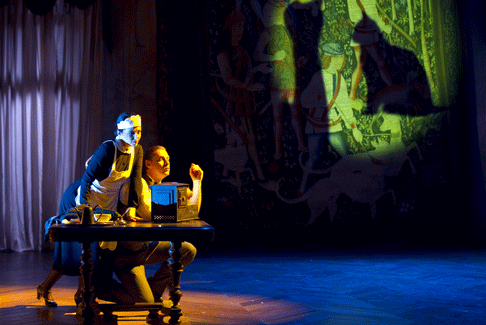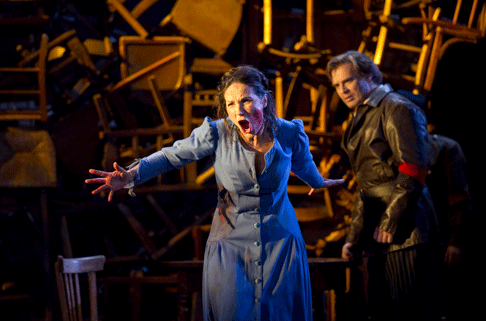Recently in Performances
English Touring Opera are delighted to announce a season of lyric monodramas to tour nationally from October to December. The season features music for solo singer and piano by Argento, Britten, Tippett and Shostakovich with a bold and inventive approach to making opera during social distancing.
This tenth of ten Live from London concerts was in fact a recorded live performance from California. It was no less enjoyable for that, and it was also uplifting to learn that this wasn’t in fact the ‘last’ LfL event that we will be able to enjoy, courtesy of VOCES8 and their fellow vocal ensembles (more below …).
Ever since Wigmore Hall announced their superb series of autumn concerts, all streamed live and available free of charge, I’d been looking forward to this song recital by Ian Bostridge and Imogen Cooper.
Although Stile Antico’s programme article for their Live from London recital introduced their selection from the many treasures of the English Renaissance in the context of the theological debates and upheavals of the Tudor and Elizabethan years, their performance was more evocative of private chamber music than of public liturgy.
Evidently, face masks don’t stifle appreciative “Bravo!”s. And, reducing audience numbers doesn’t lower the volume of such acclamations. For, the audience at Wigmore Hall gave soprano Elizabeth Llewellyn and pianist Simon Lepper a greatly deserved warm reception and hearty response following this lunchtime recital of late-Romantic song.
For this week’s Live from London vocal recital we moved from the home of VOCES8, St Anne and St Agnes in the City of London, to Kings Place, where The Sixteen - who have been associate artists at the venue for some time - presented a programme of music and words bound together by the theme of ‘reflection’.
'Such is your divine Disposation that both you excellently understand, and royally entertaine the Exercise of Musicke.’
‘And there was war in heaven: Michael and his angels fought against the dragon; and the dragon fought and his angels, And prevailed not; neither was their place found any more in heaven … that old serpent … Satan, which deceiveth the whole world: he was cast out into the earth, and his angels were cast out with him.’
There was never any doubt that the fifth of the twelve Met Stars Live in Concert broadcasts was going to be a palpably intense and vivid event, as well as a musically stunning and theatrically enervating experience.
‘Love’ was the theme for this Live from London performance by Apollo5. Given the complexity and diversity of that human emotion, and Apollo5’s reputation for versatility and diverse repertoire, ranging from Renaissance choral music to jazz, from contemporary classical works to popular song, it was no surprise that their programme spanned 500 years and several musical styles.
The Academy of St Martin in the Fields have titled their autumn series of eight concerts - which are taking place at 5pm and 7.30pm on two Saturdays each month at their home venue in Trafalgar Square, and being filmed for streaming the following Thursday - ‘re:connect’.
The London Symphony Orchestra opened their Autumn 2020 season with a homage to Oliver Knussen, who died at the age of 66 in July 2018. The programme traced a national musical lineage through the twentieth century, from Britten to Knussen, on to Mark-Anthony Turnage, and entwining the LSO and Rattle too.
With the Live from London digital vocal festival entering the second half of the series, the festival’s host, VOCES8, returned to their home at St Annes and St Agnes in the City of London to present a sequence of ‘Choral Dances’ - vocal music inspired by dance, embracing diverse genres from the Renaissance madrigal to swing jazz.
Just a few unison string wriggles from the opening of Mozart’s overture to Le nozze di Figaro are enough to make any opera-lover perch on the edge of their seat, in excited anticipation of the drama in music to come, so there could be no other curtain-raiser for this Gala Concert at the Royal Opera House, the latest instalment from ‘their House’ to ‘our houses’.
"Before the ending of the day, creator of all things, we pray that, with your accustomed mercy, you may watch over us."
The doors at The Metropolitan Opera will not open to live audiences until 2021 at the earliest, and the likelihood of normal operatic life resuming in cities around the world looks but a distant dream at present. But, while we may not be invited from our homes into the opera house for some time yet, with its free daily screenings of past productions and its pay-per-view Met Stars Live in Concert series, the Met continues to bring opera into our homes.
Music-making at this year’s Grange Festival Opera may have fallen silent in June and July, but the country house and extensive grounds of The Grange provided an ideal setting for a weekend of twelve specially conceived ‘promenade’ performances encompassing music and dance.
There’s a “slide of harmony” and “all the bones leave your body at that moment and you collapse to the floor, it’s so extraordinary.”
“Music for a while, shall all your cares beguile.”
The hum of bees rising from myriad scented blooms; gentle strains of birdsong; the cheerful chatter of picnickers beside a still lake; decorous thwacks of leather on willow; song and music floating through the warm evening air.
Performances
![L’Enfant et les Sortilèges [Photo © Opéra de Monte-Carlo]](http://www.operatoday.com/L_Enfant.gif)
06 Feb 2012
L’Enfant et les Sortilèges and La Navarraise in Monte-Carlo
The magic was in the pit, not that all Monaco was not magical — on January 25 a yellow Lamborghini, a red Ferrari, a vintage Jaguar among other magnificent machines stood before the entrance to Monte-Carlo’s resplendent Casino cum transplendent 500-seat opera house.
Even without this automotive hardware Monaco may still have been magical eighty-seven years ago when Maurice Ravel and Colette conjured a strange little comédie musicale, L’Enfant et les Sortileges for this very opera house. These days Colette’s singing cats, clocks, teakettles, etc., only sometimes recapture the magic that is said have surprised, puzzled and perturbed the monégasques (those rich enough to sojourn in Monaco) back in 1925.
Happily all of L’Enfant’s reputed magic was again present in the Salle Garnier, brought alive by Monaco’s fine Orchestre Philharmonique responding to the remarkable precision of narrative detail and intonation imposed by conductor Patrick Davin. Ravel’s score shone as the masterpiece of orchestral colors and musical wit that has won it huge respect and exposure in musical circles.
If you are among those who find people impersonating animals, objects or elements (there is a big piece for a soprano named “fire”) amusing this fine new production by the Opéra de Monte-Carlo’s general director Jean-Louis Grinda might have disappointed you. As it was we were not required to suspend disbelief for a second. It was the household staff of Mamam (the quite imposing Béatrice Uria-Monzon in full Coco Chanel regalia) who went to a great deal of trouble to terrorize Mamam’s little darling while Mamam went out for the evening.
This alone made the entertainment adult and saved us from having to rediscover the-child-that-is-in-all-of-us. In fact it was a pleasure to get back at the naughty little brat (convincingly portrayed by Swiss mezzo Carine Séchaye) by dreaming up mean and clever tricks. Cats were made by shadow puppetry and sung by their puppeteers, three household staff (very fine dancers) executed nifty slimy choreography (by Eugénie Andrin) that kept the torture relentless. The household maitre d’ actually appeared in the clock and the governess climbed atop the armoire to sing the Princess’ lament.
This realistic staging revealed the charm of this little story by the famously unconventional Colette and let us hear Ravel’s brilliant score with the eyes and ears of adults of presumed intelligence and wit. These attributes are in fact the magic of Colette and Ravel’s amusing trifle, not its fantastical characters. These were forty-five riveting minutes.
The French speaking audience (where were the Italians and the Russians?), obviously mature and certainly well-healed paid 15 euros per flûte de champagne at intermission where they were far more animated than at the perfunctory applause awarded the entertainment.
L’Enfant et les Sortileges is a chamber work of childish sentiment detailed by a very large orchestra. It is of ideal proportion to the Salle Garnier. Its companion piece, Massenet’s La Navarraise is an emotional blockbuster that was sonically stuffed into this intimate theater where it suffered a dismal production.
This brief piece attempts to impose the emotional force of Italian verismo onto French sentiments familiar to us through Alexander Dumas fils’ La Dame aux Camélias and Mérimée’s Carmen. The big blow, that hallmark of pristine verismo, was the gypsy girl’s suicide over the corpse of her lover. This final moment was very noisily presaged in the opening battle scene and by the challenge of her lover’s father that she match his dowry. She was then accused of treason, the tenor sang a great big aria and there was an even bigger battle scene.
 Scene from L’Enfant et les Sortilèges
Scene from L’Enfant et les Sortilèges
It would be hard for anyone to remain aloof from all this violence and maestro Davin certainly was not. He urged his orchestra to sing out full voice, and encouraged his singers to give everything they had. And they all did. We understood why this piece was once popular and no longer is. It is too loud and too short, a blatant and naive imitation of Cavalleria Rusticana by a capable composer who knew what the London public wanted back in 1895.
The Opéra de Monte-Carlo did Masennet’s little escapade full justice with French mezzo Béatrice Uria-Monzon, a famous Carmen who has essayed Tosca as well, as the Navarraise — a more ideal singer for this heroine of a verismo manqué cannot be imagined. Spanish tenor Enrique Ferrer was Araquil, her lover, negotiating the role’s high tessitura at continuous forte levels with apparent ease, adding the easy swashbuckle that cost him his life. Canadian baritone Jean-Françoise Lapointe was a dynamic lieutenant of beautiful voice, however baritone Marcel Vanaud as the father Remigio did not rise to sufficient vocal or histrionic stature to have motivated such a tragedy. Earlier in the evening Mr. Vanaud had portrayed a fine chair and a successful tree.
Michael Milenski
 Scene from La Navarraise
Scene from La Navarraise
![L’Enfant et les Sortilèges [Photo © Opéra de Monte-Carlo]](http://www.operatoday.com/L_Enfant.gif)

